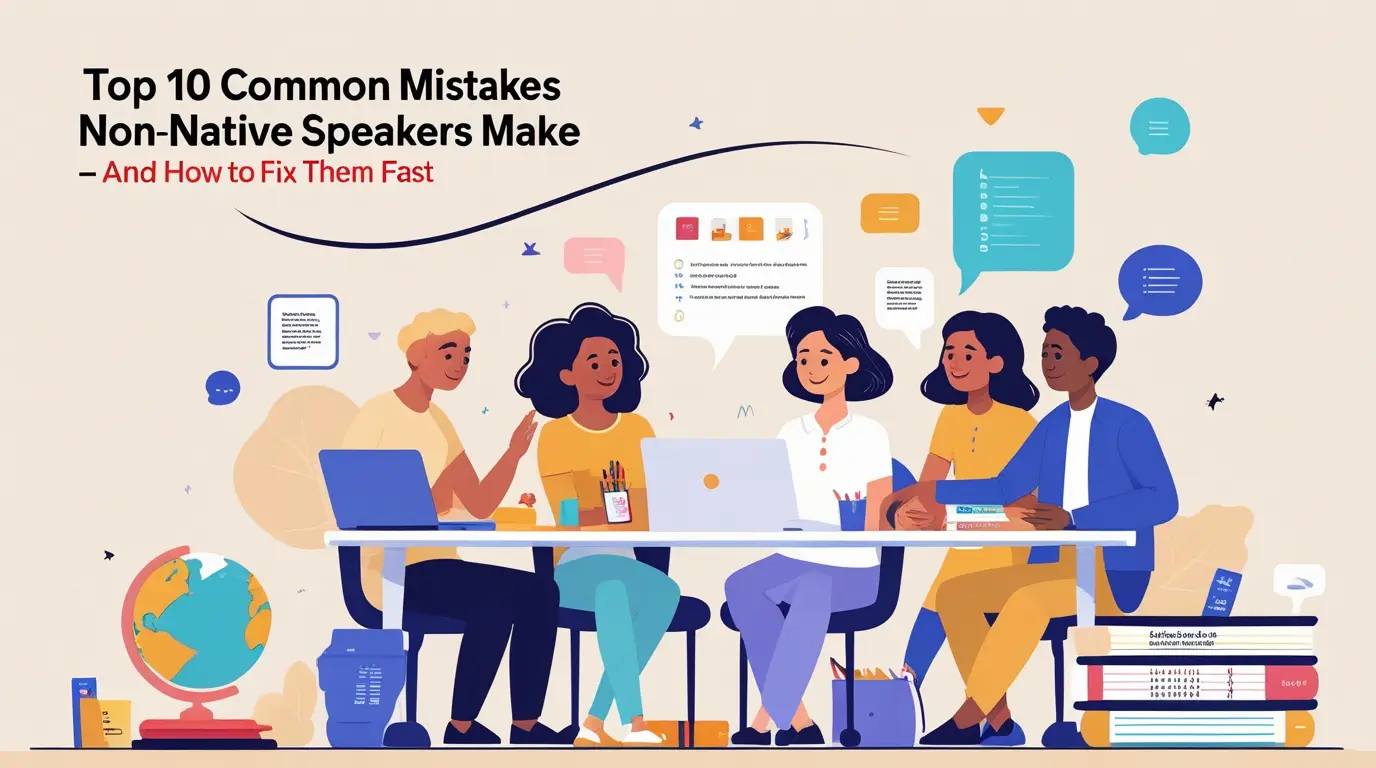
English can be a tricky language but it is also one of the most powerful tools you can have at your disposal so it can help you with everything from your career to your social interactions.
However, if you are a non-native speaker then you might have a difficult time in mastering this language and you might fall prey to some very common mistakes that especially non-native English speakers make.
What are these mistakes? Let’s find out because we are going to talk about the top 10 common mistakes non-native English speakers make and how you can fix them fast.
Here we are not going to talk about specific regionalised mistakes but we are talking about mistakes that are common with anyone picking up English as a second language.
Top 10 Common Mistakes Non-Native English Speakers Make

1. Confusing “a,” “an,” and “the”
One of the very common mistakes that new English speakers make is that they confuse the “a” with the “an” as well as “the” and do not know when or how to use it properly.
This is because articles can be very confusing in English and if you want to fix it then the best fix simply is to read a lot of English text. That way you do not even have to understand the mechanics behind it and you are simply going to be correct every time.
But if you want to fix it fast then you should use “a” before consonant sounds such as “a house” or “a cat” etc.
You should use “an” before vowel sounds such as “an apple” or “an hour”. And when you want to use “the” simply use it for something that both the speaker and the listener understand knows about.
2. Misusing Prepositions
The same is the case with prepositions because sometimes people mistake English prepositions because sometimes the rules of prepositions do not follow logic or patterns.
That is why sometimes people can make mistakes such as “I am good in calculations” or “She is married with a doctor.”
The only solution to this is to read a lot of English text so that you can never make these kinds of mistakes and always say the right things such as “ good at calculations”, “ married to a doctor” etc.
3. Incorrect Word Order in Questions
The simplest rule to understand is that English questions need subject-verb inversion and when you do not have that in the correct order the question sounds wrong and is wrong.
For example, you can make very common mistakes such as “You are coming?” or “Where you are going?”. But if you make these mistakes then it does not qualify as a question and becomes a statement.
Fixing it fast means you need to use helping verbs such as “do,” “does,” “are,” “can” to form questions. For example “Are you coming?” or “Where are you going?”.
4. Confusing Adjective and Adverb Forms
This is easily one of the most common mistakes and we are talking about the confusion between adjectives and adverb.
If you want to fix this then you need to understand what they mean.
Adverbs modify verbs and adjectives modify nouns or pronouns. Most adverbs are basically done by adding “ly” at the end of adjectives.
Like for example, “He runs very quickly.”
5. Overusing Present Continuous
If you overuse the present continuous tense then it is not only going to be wrong but it will also sound very wrong.
It will also help the listener understand you are a non-native speaker.
We are talking about mistakes such as, “I am knowing the answer.” Or “She is liking pizza.”
If you want to fix this then you need to understand that some verbs and especially stative verbs do not usually take continuous forms. In that situation simple present is the correct thing to use.
Like for example, “I know the answer.” Or “She likes pizza.”
6. Using the Wrong Verb Tense
When you are not able to match the verb tense with the time of the action you make the mistake of using the wrong word tense. This can be something like “Yesterday, I go to the market.” Or “He has eat lunch.”
In order to fix this you should understand common irregular verbs and their past present in future tense and use it correctly.
In this example the correct version would be “Yesterday, I went to the market.” And “He has eaten lunch.”
7. Literal Translation from Native Language
Another common mistake that non-native speakers make is that they mix up expressions when they are translating something from their native language.
In order to fix that you need to understand how both of these two languages work and honestly fixing it fast can be with the help of a translator app.
8. Forgetting the Subject
English is always going to need a subject because without it the sentence will become meaningless but sometimes non-native speakers make the mistake of missing the subject. For example, “Is raining today.” Or “Looks good!”
Want to fix it? Just add some subject at the start like “it”. For example, “It is raining today.” Or “It looks good.”
9. Pluralization Errors
Many languages might not have the concept of singular and plural in them and that is where a non-native speaker might make the mistake of adding or removing plural from words or using them incorrectly.
They can make the very common mistake of saying childs and mans etc.
The solution to this is to understand how irregular plurals work because the plural of child is going to be children and the plural of man is going to be men etc.
10. Pronunciation Pitfalls
The last very common mistake we are going to talk about is a mispronunciation and this is yet again a very common mistake non-native speakers make which can lead to errors.
If they are not used in the context properly then it can even change the meaning of the word. For example, if you are a sailor and you want to say ship and instead if you say sheep then it can be quite embarrassing.
The way to fix this is to simply listen to how these words are said.
English can be a complicated language but English becomes quite easy if you just do a little bit of practice. But sometimes this practice is not going to be effective if you do it all by yourself.
That’s why if you are looking for some of the most experienced English educators teaching you some of the most highly reputed English courses in the industry then we are here for you.
We are Love U English and we present you our specially formulated CLT method of spoken English courses that are designed to help you master the perfect versions of westernized spoken English that you can then utilise in your workplace.
We welcome you to visit our website and check out everything we do.
